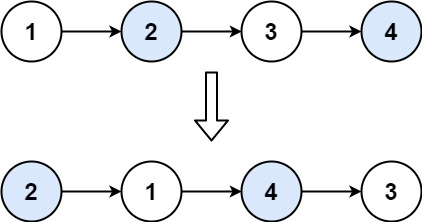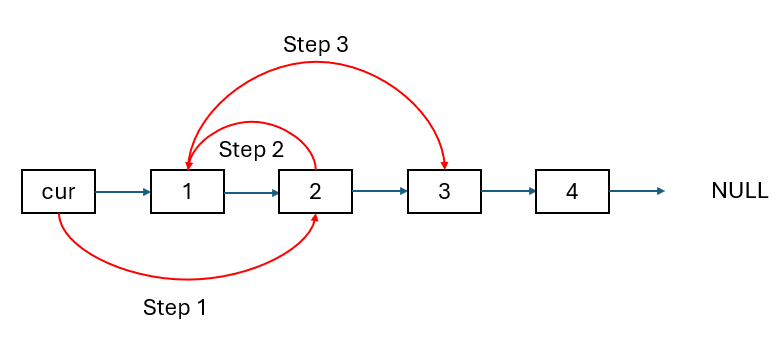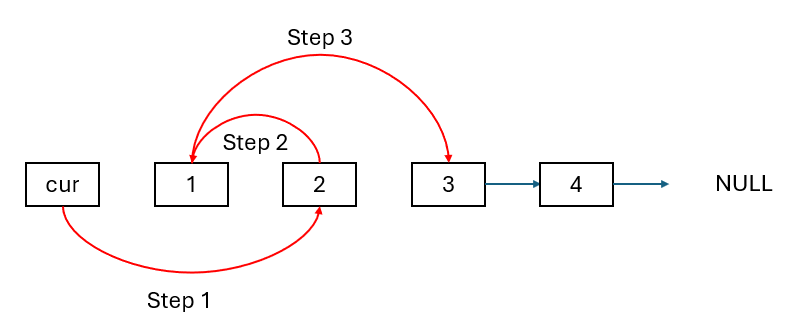LeetCode Link: 24. Swap Nodes in Pairs
Problem Definition
Given a linked list, swap every two adjacent nodes and return its head. You must solve the problem without modifying the values in the list's nodes (i.e., only nodes themselves may be changed.)
Example 1:
Input: head = [1,2,3,4]
Output: [2,1,4,3]
Explanation:

Example 2:
Input: head = []
Output: []
Example 3:
Input: head = [1]
Output: [1]
Example 4:
Input: head = [1,2,3]
Output: [2,1,3]
Constraints:
- The number of nodes in the list is in the range
[0, 100]. 0 <= Node.val <= 100
Thought Process
It is recommended to use a dummy head node, which will make it much more convenient. Otherwise, you would have to handle the head node separately each time (since there isn't a previous pointer pointing to the head node).
If you're not familiar with operations on dummy head nodes, you can refer to this article.

Next, it's time to swap two adjacent elements. At this point, you must draw a diagram; without it, handling multiple pointers can easily become confusing, especially regarding the order of operations.
Initially, cur points to the dummy head node and then follows these three steps:

After the operation, the linked list is as follows:

Solution 1 - Dummy Head
# Definition for singly-linked list.
# class ListNode:
# def __init__(self, val=0, next=None):
# self.val = val
# self.next = next
class Solution:
def swapPairs(self, head: ListNode) -> ListNode:
# Edge cases: empty list or single node
if not head or not head.next:
return head
# Create a dummy node to handle edge cases more elegantly
dummy = ListNode(0)
dummy.next = head
prev = dummy
while prev.next and prev.next.next:
# Node positions for swapping
first = prev.next
second = first.next
# Perform the swap
first.next = second.next
second.next = first
prev.next = second
# Move to the next pair
prev = first
return dummy.nextTime Complexity: O(n)
Space Complexity: O(1)
Solution 2 - Recursion
def swapPairs(self, head: Optional[ListNode]) -> Optional[ListNode]:
# Base case: if the list is empty or has only one node, no swap is needed
if not head or not head.next:
return head
# Identify nodes for swapping
first_node = head # The first node of the pair
second_node = head.next # The second node of the pair
rest_of_list = head.next.next # The rest of the list after the pair
# Step 1: Swap the pair
second_node.next = first_node # The second node points to the first node
# Step 2: Recursively swap the rest of the list in pairs
first_node.next = self.swapPairs(rest_of_list) # Connect the swapped pair with the next pairs
# Return the new head of the list, which is the second node in the current pair
return second_nodeComparison Summary
| Feature | Recursive Approach | Iterative Approach (with Dummy Node) |
|---|---|---|
| Ease of Reading | Simple and readable | Slightly more complex due to pointer handling |
| Memory Usage | Higher due to recursive stack | Lower, as it’s iterative |
| Performance | Potentially slower for large lists | More efficient for large lists |
| Edge Case Handling | Base case check handles it | Dummy node elegantly handles edge cases |
| Pointer Management | Minimal, due to recursion | Requires precise handling of prev, first, and second pointers |
Read next
Fuel my Writing ⛽
Every creator needs fuel to keep going. If my work has helped you, a small tip would make my day and help me create more!
Tip Jar

Discussion